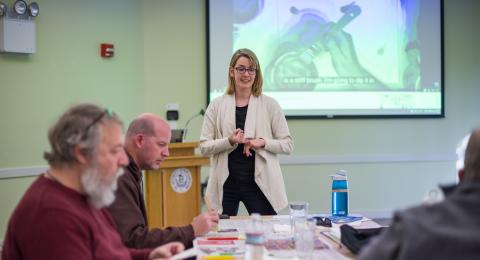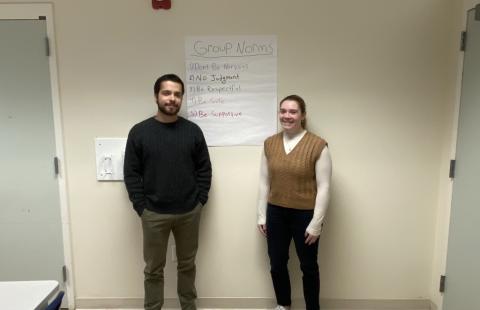WHY GET YOUR CLINICAL DOCTORAL DEGREE IN OCCUPATIONAL THERAPY?
An entry level, doctoral degree in occupational therapy will prepare students to enter the profession with strong foundational skills in occupational therapy assessment and intervention, advanced training in clinical skills, leadership, clinical research, and program development. Throughout the doctoral program, students will be challenged to learn and apply occupational therapy principles to traditional and emerging areas of practice, in hospital and community-based settings and for individual clients and population groups. Graduates gain valuable skills to become leaders in their field, advance in their careers, and position themselves as agents of change to influence policy and practice.
WHY CHOOSE UNH’S OTD PROGRAM?
Our Occupational Therapy Doctorate (OTD) program is the perfect choice for students ready to elevate their careers through advanced clinical training and leadership preparation.
Pathway to Your Degree: Complete your OTD in just three years (nine semesters plus one January term) if you hold a bachelor’s in a related field.
Innovative Learning: Our program is primarily offered in-person, ensuring hands-on, engaging experiences. Courses are delivered on our UNH Durham campus, creating a vibrant community of peers and faculty.
Expert Faculty, Personalized Mentorship: Learn directly from distinguished faculty mentors who bring clinical expertise and a commitment to evidence-based practice. With individualized guidance, you’ll gain the confidence and skills to excel in diverse practice settings.
The Doctoral Capstone Advantage: Through the doctoral capstone project, UNH OTD students engage in a mentored, in-depth project to develop advanced skills in a focused area of interest. Each student designs and completes an individualized project that may emphasize clinical practice, research, administration, leadership, program and policy development, advocacy, or education. With dedicated faculty mentorship and community partnerships, doctoral capstone projects allow students to transform their passions into meaningful contributions that advance the profession and create lasting impact.
POTENTIAL CAREER AREAS
- Administration
- Early intervention programs
- Hospitals
- In-patient rehabilitation centers
- Mental health and substance abuse programs
- Primary care settings
- School settings
- Skilled nursing facilities
- OT clinical researcher
- OT educator
From the CHHS Blog
Curriculum & Requirements
An entry level doctoral degree in occupational therapy will prepare you for a career supporting people in the daily activities that are important to them from dressing, to cooking, to work or school, to leisure and hobbies. UNH will prepare you to enter a fast-growing field to work with people of all ages in a range of settings by developing strong foundational skills in occupational therapy assessment and intervention, advanced training in clinical skills, leadership and advocacy, clinical research, and program development. Our program emphasizes the understanding that engagement in valued activities fulfills social needs, gives meaning to life, and is essential to the development, adaptation, and well-being of individuals and populations. You will learn to evaluate, plan and provide intervention, and monitor the outcomes of clients facing a variety of illnesses, injuries, and disabilities such as autism, traumatic brain injury, stroke, substance abuse and musculoskeletal injuries.At UNH, you will learn and apply occupational therapy principles to traditional and emerging areas of practice, in hospital and community-based settings and for individual clients and population groups. Graduates gain valuable skills to become leaders in their field, advance in their careers, and position themselves as agents of change to influence policy and practice.
When entering the OTD Program you will complete 3 years (9 semesters) of professional courses to prepare you for all areas of occupational therapy practice. Coursework begins in the summer session and continues throughout 3 calendar years, including one January term for a one-week full-time level I fieldwork experience. Courses are primarily in-person, particularly during the academic year, with some distance learning activities. Courses are scheduled during weekdays during the day and into early evening. Some courses include experiential, off-campus learning. The curriculum includes two 12-week fieldwork experiences, totaling 24 weeks of full-time fieldwork. You may also choose to complete a graduate certificate in assistive technology or elective to focus your education. As an OTD student, you will conclude your education with a 14-week doctoral capstone where you apply and expand your knowledge to take on a leadership role to develop a new program addressing specific client needs, conduct research, promote policy changes, or provide education.
After completing your degree, including fieldwork and the doctoral capstone, you will be eligible to sit for the National Board for Certification in Occupational Therapy examination to become a registered occupational therapist (OTR). In addition, all states require licensure in order to practice; however, state licenses are usually based on the results of the NBCOT Certification Examination. Consistent with NBCOT expectations, students must sit for the certification examination within three years of degree completion. Note that a felony conviction may affect your ability to sit for the NBCOT certification examination or attain state licensure.
OTD Program Accreditation Status
The entry-level occupational therapy doctoral degree program has been granted Candidacy Status by the Accreditation Council for Occupational Therapy Education (ACOTE) of the American Occupational Therapy Association (AOTA), located at 6116 Executive Boulevard, Suite 200, North Bethesda, MD 20852-4929, (301) 652-AOTA. The program must have a preaccreditation review, complete an on-site evaluation, and be granted Accreditation Status before its graduates will be eligible to sit for the national certification examination for the occupational therapist administered by the National Board for Certification in Occupational Therapy (NBCOT). The UNH Program is scheduled for on-site evaluation in the fall of 2025, prior to a May 2026 graduation for the first graduating cohort.
Academic Standards and Policies
In order to be awarded an OTD in Occupational Therapy from UNH, students must maintain an overall GPA of 3.0 and earn a minimum of B- in all required occupational therapy courses, and may not earn more than 8 credits of B- in OT courses (700 level or above). Students must pass all competency (practical) exams as part of OT courses, pass all level I fieldwork requirements and receive a passing criterion score on the American Occupational Therapy Association Fieldwork Performance Evaluation for the Occupational Therapist in both 12-week Level II fieldwork experiences and successfully complete a Capstone Experience.
In addition to the academic standards above, students must meet professional behavior standards, which are explained in detail in the OT Department Policy and Procedure Manual, provided to all occupational therapy students during their first semester
Because curriculum review and revision are undertaken annually, occupational therapy faculty work closely with students during academic advising sessions and share information about any policy and requirement changes during registration periods as well as throughout the academic year. Students are expected to take an active role in verifying expectations and requirements and should check with their departmental advisers each September for updated policies and requirements. Program requirements and policies for retention in the major are posted annually in the OT Department Policy and Procedure Manual, which is available on the OT department’s organization site on the Learning Management Platform, MyCourses.
Students participate in a variety of off-campus and fieldwork experiences throughout the course of study and are covered with basic personal liability insurance through UNH for all practical components of the curriculum. Students are responsible for transportation to fieldwork sites and other off-campus learning experiences. Students are responsible for meeting the health and criminal record/background clearances established by their fieldwork sites and off-campus learning sites including capstone sites. Proof of immunization such as poliomyelitis, rubella, H1N1, and hepatitis B may also be required. For Level II fieldwork, health insurance and a physical examination, including a tuberculin test, are required. All fieldwork experiences are scheduled in centers approved by the Department of Occupational Therapy and with whom active Memoranda of Understanding with UNH exist. Fieldwork is planned collaboratively with the Academic Fieldwork Coordinator and capstone is planned with guidance from the Capstone Coordinator.
Occupational Therapy (OTD)
| First Year | ||
|---|---|---|
| Summer | Credits | |
| OT 841 | Human Occupation | 3 |
| Credits | 3 | |
| Fall | ||
| OT 851 | Mind Body Systems/Neurologically-based Function and Dysfunction | 3 |
| OT 810 | OT Practice and Professional Roles | 3 |
| OT 852 & 852L | Human Movement and Environmental Effects on Everyday Occupations and Human Movement and Environmental Effects on Everyday Occupations Lab | 4 |
| OT 881 | Introduction to Research and Evidence-Based Practice | 3 |
| OT 844 | Fieldwork and Professionalism - Level 1 | 1 |
| Credits | 14 | |
| January Term | ||
| OT 892 | Level I Fieldwork | 1 |
| Credits | 1 | |
| Spring | ||
| OT 863 & 863L & 863R | Occupational Therapy Intervention for Adults and Occupational Therapy Evaluation and Intervention for Adults - Lab and Adult Evaluation and Intervention Recitation | 4 |
| OT 882 | Research Methods and Application | 3 |
| OT 862 & 862L & 862R | OT Evaluation and Intervention for Children and OT Evaluation and Intervention for Children - Lab and OT Evaluation and Intervention for Children Recitation | 4 |
| OT 850 | Neuro-Occupation: The Relationship Between Occupation and the Brain | 3 |
| Credits | 14 | |
| Second Year | ||
| Summer | ||
| OT 964 | Age Well: Occupational Therapy with Older Adults | 3 |
| OT 998 | Recent Advances in Neurological Evaluation and Intervention (Optional Elective or Grad Cert course) | 3 |
| OT 845 | Administration and Management for Occupational Therapy Practice | 3 |
| Credits | 9 | |
| Fall | ||
| OT 860 & 860L & 860R | Psychosocial Evaluation and Intervention and Psychosocial Evaluation and Intervention Lab and Psychosocial Evaluation & Intervention Recitation | 4 |
| OT 830 & 830L | Assistive Technology for Enhancing Occupational Performance and Assistive Technology for Enhancing Occupational Performance Lab | 4 |
| OT 871 & 871L | Enabling Participation in Community Groups and Enabling Participation in Community Groups Lab | 4 |
| OT 846 | Fieldwork and Professionalism-Level II | 1 |
| Required Elective or Grad Certificate | 3-4 | |
| Credits | 16-17 | |
| Spring | ||
| OT 854 | Level II Fieldwork, I | 8 |
| OT 855 | Level II Fieldwork Discussion | 1 |
| OT 856 | Level II Fieldwork, II | 8 |
| Credits | 17 | |
| Third Year | ||
| Summer | ||
| OT 901 | Introduction to Capstone | 2 |
| Credits | 2 | |
| Fall | ||
| OT 965 | Occupational Therapy Practice and Professional Reasoning | 3 |
| OT 975 | Leadership in OT Systems of Practice | 3 |
| OT 902 | Capstone Preparation | 3 |
| OT 983 | Engagement in Research | 3 |
| Credits | 12 | |
| Spring | ||
| OT 903 | Capstone: Project Implementation, Evaluation and Dissemination | 12 |
| Credits | 12 | |
| Total Credits | 100-101 | |
Degree Requirements
In order to be awarded an OTD in Occupational Therapy from UNH, students must maintain an overall GPA of 3.0 and earn a minimum of B- in all required occupational therapy courses and may not earn more than 8 credits of B- or lower in OT courses (700 level or above). Students must pass all competency (practical) exams as part of OT courses, pass all level I fieldwork requirements and receive a passing criterion score on the American Occupational Therapy Association Fieldwork Performance Evaluation for the Occupational Therapist in both 12-week Level II fieldwork experiences.
| Code | Title | Credits |
|---|---|---|
| Required Courses | ||
| OT 810 | OT Practice and Professional Roles | 3 |
| OT 830 & 830L | Assistive Technology for Enhancing Occupational Performance and Assistive Technology for Enhancing Occupational Performance Lab | 4 |
| OT 841 | Human Occupation | 3 |
| OT 844 | Fieldwork and Professionalism - Level 1 | 1 |
| OT 845 | Administration and Management for Occupational Therapy Practice | 3 |
| OT 846 | Fieldwork and Professionalism-Level II | 1 |
| OT 850 | Neuro-Occupation: The Relationship Between Occupation and the Brain | 3 |
| OT 851 | Mind Body Systems/Neurologically-based Function and Dysfunction | 3 |
| OT 852 & 852L | Human Movement and Environmental Effects on Everyday Occupations and Human Movement and Environmental Effects on Everyday Occupations Lab | 4 |
| OT 854 | Level II Fieldwork, I | 8 |
| OT 855 | Level II Fieldwork Discussion | 1 |
| OT 856 | Level II Fieldwork, II | 8 |
| OT 860 & 860L & 860R | Psychosocial Evaluation and Intervention and Psychosocial Evaluation and Intervention Lab and Psychosocial Evaluation & Intervention Recitation | 4 |
| OT 862 & 862L & 862R | OT Evaluation and Intervention for Children and OT Evaluation and Intervention for Children - Lab and OT Evaluation and Intervention for Children Recitation | 4 |
| OT 863 & 863L & 863R | Occupational Therapy Intervention for Adults and Occupational Therapy Evaluation and Intervention for Adults - Lab and Adult Evaluation and Intervention Recitation | 4 |
| OT 871 & 871L | Enabling Participation in Community Groups and Enabling Participation in Community Groups Lab | 4 |
| OT 881 | Introduction to Research and Evidence-Based Practice | 3 |
| OT 882 | Research Methods and Application | 3 |
| OT 892 | Level I Fieldwork | 1 |
| OT 964 | Age Well: Occupational Therapy with Older Adults | 3 |
| OT 998 | Recent Advances in Neurological Evaluation and Intervention | 3 |
| OT 983 | Engagement in Research | 3 |
| OT 965 | Occupational Therapy Practice and Professional Reasoning | 3 |
| OT 975 | Leadership in OT Systems of Practice | 3 |
| OT 901 | Introduction to Capstone | 2 |
| OT 902 | Capstone Preparation | 3 |
| OT 903 | Capstone: Project Implementation, Evaluation and Dissemination | 12 |
| Elective or Graduate Certificate Course | 3-4 | |
Program Learning Outcomes
Occupational Therapy OTD Entry-level Program Student Outcomes at the completion of the professional entry-level OTD Program, our graduates will:
- Demonstrate commitment and ability to use meaningful occupation for promoting health and well-being. Our curriculum emphasizes the idea that engagement in everyday occupations will lead to fulfillment of life roles and the promotion of health and well-being of individuals, communities, and populations. Our graduates are ready and dedicated to apply occupation-based evaluation and intervention techniques, and to share and expand authentic occupational therapy practice.
- Demonstrate professional attitudes and behaviors in their interactions with clients and others. Our graduates will be dedicated to ethical, client-driven practice demonstrating cultural sensitivity, integrity, honesty, compassion, and fairness. They will demonstrate respect for all persons with whom they work, appreciating and considering individual identities, priorities, abilities, and life experiences. They will be able to collaborate in intraprofessional and interdisciplinary teams within various settings, understanding the roles and expertise of other occupational therapists and other professionals.
- Demonstrate entry-level competencies as OT practitioners across diverse practice settings, skilled in the delivery evidence-based, occupation–centered evaluation and intervention techniques. Our graduates develop critical thinking skills and the capacity for creative clinical reasoning for providing client-centered, occupation-centered services. Graduates will apply a variety of evaluation methods for understanding a person’s occupational history, abilities, challenges and goals. They will apply occupation-centered intervention approaches and innovative technologies to address the needs of individuals and populations in traditional and emerging medical, educational, and other community-based practice settings.
- Demonstrate skills for translating research-to-practice and generating new knowledge grounded in occupational therapy practice. Our graduates will be skilled in identifying, critiquing, and synthesizing relevant research for delivering evidence-based services. Graduates will demonstrate capacity to translate research evidence to influence practice. They will have skills for contributing to the body of knowledge that supports and advances the profession.
- Demonstrate skills to become leaders and innovators as practitioners, researchers, advocates, educators, administrators, policy-makers, and entrepreneurs. Our graduates will apply leadership knowledge and skills, ethical reasoning, knowledge of policy and systems to be agents of change in diverse settings. Our graduates will be life-long learners and innovative thinkers committed to ongoing professional development. Our graduates will support and promote occupational justice for individuals, communities, and populations.
Professional Licensure/Certification Disclosures
The University of New Hampshire offers a number of academic programs designed to lead to professional licensure or certification in New Hampshire. However, completing a UNH degree/program does not guarantee professional licensure or certification. Eligibility may also depend on factors like years of work experience, professional examinations, passing a background check, and other criteria.
UNH does not guarantee that its professional licensure programs will satisfy the criteria of professional licensure boards in other states. Some states maintain different requirements for professional licensure or certification and requirements can change frequently. Federal regulations require the University to make public disclosure of certain information regarding professional licensure or certification programs, regardless of the modality the program is offered (i.e., in-person or online). The University provides guidance below but recommends students contact their state/territory licensing or certification board to ensure a program meets specific state/territory requirements.
Visit the Office of the Registrar's website for information about whether this program meets professional licensure requirements in your state.
The UNH Occupational Therapy Department accepts applications from interested students with a baccalaureate degree in another area of study for entry into the OTD Program classes beginning in the Summer session.
UNH students enrolled in the BS/OTD Program will begin taking professional level courses as part of their BS degree and apply to enter the OTD Program with Advanced Standing.
Students hoping to apply to the Occupational Therapy Doctorate program in Occupational Therapy at UNH should complete their application through the Occupational Therapy Centralized Application Service (OTCAS). To do so, follow this link, create a login, search for "University of New Hampshire" in the list of available schools, and click on the "+" sign on the left side of the screen to begin your application. When applying through OTCAS please use your UNH email address if you were a previous UNH student.
Deadlines
Applications must be completed by the following deadlines in order to be reviewed for admission:
- Fall: April 10
- Spring: N/A
- Summer: N/A
- Special: N/A
Application fee: $169 for the first program applicants apply to and $71 for each additional program.
*A limited number of fee waivers are provided to qualified applicants on a first-come, first-served basis. Learn more about fee waivers.
Campus: Durham
New England Regional: CT MA RI
Accelerated Masters Eligible: No
New Hampshire Residents
Students claiming in-state residency must also submit a Proof of Residence Form. This form is not required to complete your application, but you will need to submit it after you are offered admission, or you will not be able to register for classes.
Transcripts
OTCAS will require official transcripts to be uploaded to your portal.
Letters of recommendation: 3 required
Recommendation letters submitted by relatives or friends, as well as letters older than one year, will not be accepted.
Two of these must address the applicant's educational abilities/performance and come from academic faculty. One letter must address the applicant's interpersonal/communication skills as observed in a volunteer or paid-employment setting.
Personal Statement/Essay Questions
We are looking for strong writing skills and a clear presentation of your understanding of Occupational Therapy. We especially appreciate creative approaches to telling your story and describing why you believe you would be a good fit for the profession.
Resume
A current resume is required with your submitted application.
The Occupational Therapy Department at UNH has applied for accreditation for an entry-level occupational therapy doctoral degree program and has been granted Candidacy Status by the Accreditation Council for Occupational Therapy Education (ACOTE) of the American Occupational Therapy Association (AOTA), located at 6116 Executive Boulevard, Suite 200, North Bethesda, MD 20852-4929. ACOTE’s telephone number c/o AOTA is (301) 652-AOTAand its Web address is www.acoteonline.org. The program must have a preaccreditation review, complete an on-site evaluation, and be granted Accreditation Status before its graduates will be eligible to sit for the national certification examination for the occupational therapist administered by the National Board for Certification in Occupational Therapy (NBCOT). The UNH Program is scheduled for on-site evaluation in the fall of 2025, prior to a May 2026 graduation.
Students must complete 24 weeks of Level II fieldwork within two years of completing professional program academic coursework. They must also complete an individual 14-week doctoral capstone experience within 12 months following the completion of all required coursework and Level II fieldwork as well as completion of preparatory capstone activities.
After completing all program requirements, students are eligible to sit for the national certification examination for the occupational therapist, administered by the National Board for Certification in Occupational Therapy (NBCOT). After successful completion of the NBCOT exam, the individual will be an Occupational Therapist, Registered (OTR). In addition, all states require licensure in order to practice; however, state licenses are usually based on the results of the NBCOT Certification Examination. Note that a felony conviction may affect a graduate’s ability to sit for the NBCOT certification examination or attain state licensure.
The UNH Occupational Therapy Department will accept applications from interested students with a baccalaureate degree in another area of study for entry into the OTD Program classes beginning in the Summer session.
UNH students enrolled in the BS/OTD Program will begin taking professional level courses as part of their BS degree and enter the OTD Program with Advanced Standing.
Important Notes
All applicants are encouraged to contact programs directly to discuss program-specific application questions.
International Applicants
Prospective international students are required to submit TOEFL, IELTS, or equivalent examination scores. English Language Exams may be waived if English is your first language. If you wish to request a waiver, then please visit our Test Scores webpage for more information.
Explore Program Details
OTD Occupational Therapy Prerequisites
- A completed BA or BS degree. Applicants need a minimum overall grade point of 3.0 in undergraduate coursework and the following prerequisite courses:
- Human Anatomy and Physiology I & II (2 courses, both with required labs)
- Neuroanatomy (lab preferred)
The Neuroanatomy course must include content related to the neural basis for movement and sensory functions. This includes an overview of the anatomical organization and function of the central nervous system, gross anatomy of both central and peripheral nervous system (including blood supply and meninges), sensory pathways, motor pathways, cranial nerves, and the spinal cord and spinal nerves. At the end of the course, students should have a basic working knowledge of the central nervous system in order to participate in the neurological examination of individuals with neurological impairments.
* UNH offers KIN706 Neurology as an online course during summer session that will include online lab experiences.
* Neurology can often be found at schools that offer medical based programs, including occupational therapy and/or physical therapy programs. Neuroscience or neuropsychology courses typically do not meet this prerequisite. - Clinical Kinesiology (lab preferred)
The clinical kinesiology course must include content related to the anatomy and physiology of the skeletal and muscular systems, sensory innervation of muscles, and basic biomechanics.
* UNH offers KIN652 Clinical Kinesiology as an online course during summer session. - Statistics
- Abnormal Psychology
- Medical Terminology
- Human Development
* Coursework should include all stages of human development from birth through old age. This information may be covered in one lifespan course or multiple courses (i.e.: child development and adult development).
Do all of the prerequisites need to be completed to apply?
Students who have completed all prerequisites will be reviewed more favorably, however, students may apply while still completing prerequisite courses. All prerequisites must be completed before beginning the program in the Summer semester.
Where can I take the prerequisites?
Prerequisite courses may be completed at any accredited college or university. Prerequisite course must be taken for college credit with a letter grade of a B- or better.
What are the prerequisites for the OTD Program?
Mandatory prerequisites:
- Human Anatomy and Physiology with labs--2 courses
- Clinical Kinesiology (lab preferred but not required)
- Neuroanatomy (with lab)
- Statistics
- Human development course(s) covering the lifespan (may be done with two courses, one covering child development and one covering adult development)
- Abnormal Psychology
- Medical Terminology
Do all of the prerequisites need to be completed to apply?
Students who have completed all prerequisites will be reviewed more favorably, however, students may apply while still completing prerequisite courses. All prerequisites must be completed before beginning the program in the Summer semester.
Does the Department offer financial support to OTD students?
As a public institution, UNH offers competitive pricing for our programs and does not have tuition discount packages to offer graduate students. Students will need to finance their education independently and can seek assistance through the UNH financial aid office to discuss options. Our department has a number of internal scholarships and teaching/research assistantships that we offer to several students at the end of the first year. These typically range from $1,500-$3,500 for the following academic year. If interested in these opportunities, we encourage students to speak to their advisor.
How can I schedule a tour?
To register for a campus tour please visit admissions.
How do I apply to the OTD Program?
Please apply through the graduate school online application.
How do I register for prerequisite courses at UNH?
To register as a Non-degree student, you must go through Continuing Education.
I have been out of school for many years and don't have access to recent professors to ask for references. What should I do?
We are looking for references who can speak to your ability to handle complex and dynamic information, your work ethic, your ability to handle stress, and your communication skills. While we prefer two references from recent professors, people who have supervised you in a professional, work/volunteer capacity are also acceptable.
What is the deadline for OTD Applications?
** Application Deadline for the OTD Program: January 15 recommended, March 1 final**
However, we encourage applications to be submitted to the graduate school by the end of December to ensure that all applications are complete in time for review. We also encourage applicants to periodically review their application status on the graduate school website and to contact the graduate school if items are missing.
What is the topic for the admissions essay?
We are looking for strong writing skills and a clear presentation of your understanding of Occupational Therapy. We especially appreciate creative approaches to telling your story and describing why you believe you would be a good fit for the profession.
What should I look for in a neuroanatomy course?
The Neuroanatomy course must be rich in content related to the neural basis for movement and sensory functions. Course content must incorporate an overview of the anatomical organization and function of the central nervous system, including blood supply and meninges; sensory pathways; motor pathways; cranial nerves; and spinal cord, including spinal nerves. Typical course objectives of an appropriate course should include wording about providing students with a basic working knowledge of the central nervous system and presenting the basic functional neuroanatomy required to understand and interpret the neurological examination of individuals with neurological impairments.
These courses can often be found at schools that offer medical professions education, including Occupational Therapy and/or Physical Therapy majors. UNH offers this course (KIN706/707) in the fall semester and in the early summer. There is one acceptable online course of which we are aware at San Jose State (Bio 109). Neuroscience courses typically do not meet this prerequisite.
Where can I take the prerequisites?
Prerequisite courses may be completed at any accredited college or university.
Students in the professional program must meet program requirements:
- A minimum GPA of 3.0 (overall) is required for continuation in the professional program.
- Grades B- or above in all courses. Students earning B- or lower in 9 or more credits will be dismissed from the professional program.
- Passing grades in all fieldwork components and doctoral capstone.
- Passing all competency exams for courses on the first or second attempt.
- Acceptable professional behavior identified on the OT Department Pillars of Professional Behaviors.
Students who do not meet these standards will be dismissed from the program.
Note: Students must successfully complete all Level II fieldwork requirements within two years of completion of the professional program academic coursework. Students must successfully complete all capstone requirements within three years of the completion of the professional academic coursework.
Once students have completed all their academic and fieldwork requirements for entry-level practice, they prepare to take the NBCOT exam. This is one exam for which students cannot cram! But students certainly can prepare for it. The below links provide information about the exam's format and content and guide you through the process of using your fieldwork experience as a study guide.
OUTLINE OF EXAM CONTENTS
PREPARING FOR THE EXAM
NBCOT EXAM ELIGIBILITY
NBCOT WEBSITE
Prior to coming to campus, please review the USNH Computer Software and Hardware Recommendations as well as the IT Guide: Student Technology Checklist and and make sure you’ve completed all required steps.
From courses and programs to materials and websites, UNH is committed to creating accessible and inclusive campus. We understand that accessibility is not something that happens by accident. Accessibility is a community effort that requires proactive planning and thoughtful consideration of how we can incorporate accessibility into what we do and how we do it. Learn more about Accessibility at UNH here.




















